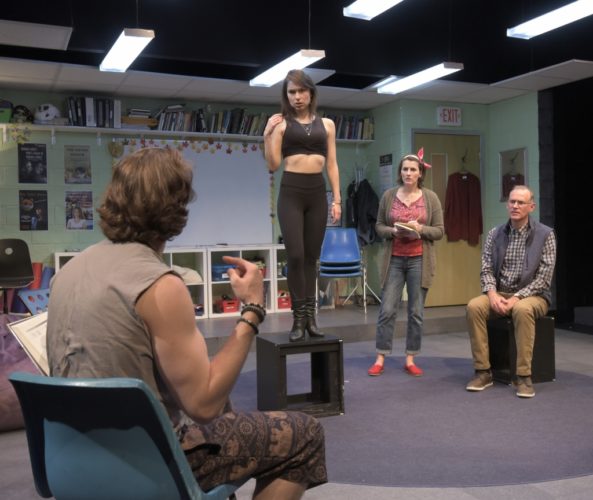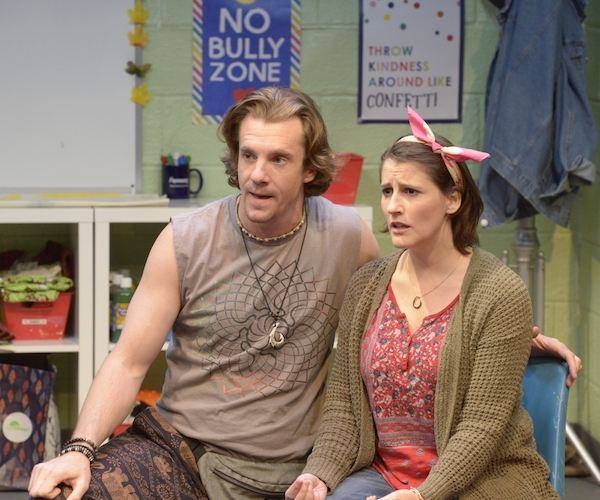Theater Review: “The Thanksgiving Play” — The Perils of “Wokeness”
By Erik Nikander
When confronted with a seemingly intractable quandary, playwright Larissa FastHorse — and her characters — take the easy way out.
The Thanksgiving Play by Larissa FastHorse. Directed by Scott Edmiston. Staged by the Lyric Stage at 140 Clarendon Street, Copley Square, Boston, MA, through November 10.

Jesse Hinson, Grace Experience, Amanda Collins, and Barlow Adamson in the Lyric Stage production of “The Thanksgiving Play.” Photo: Glenn Perry.
To say that Native Americans and white people have had a fraught relationship over the last several centuries would be a massive understatement. From outright genocide and colonization to stereotyping and vilification through mass media, white Americans have inflicted so much harm on their indigenous neighbors that it’s difficult to know just how things can be changed for the better. That’s the position the well-meaning white characters find themselves in at the start of Larissa FastHorse’s The Thanksgiving Play, a satirical comedy on the perils of self-serving “wokeness” in the 21st century. The play tackles, with plenty of zeal, hot-button issues like representation and cultural authenticity, but unfortunately goes out with a whimper rather than a bang. When confronted with a seemingly intractable quandary, FastHorse — and her characters — take the easy way out.
The plot: high school theater director Logan has won a grant to create play about the first Thanksgiving that respectfully pays tribute to the Native Americans’ role in this legendary feast. She enlists the help of her boyfriend Jaxton (Jesse Hinson), an earthy-crunchy street performer, along with elementary school history teacher Caden (Barlow Adamson). They also hire a Native American actor named Alicia (Grace Experience) to add a little authenticity, only to find out that – spoiler alert – she may have played Native Americans, but Alicia is just as white as the rest of the cast. After this shock, Logan is faced with a challenge: she must pull together a Thanksgiving play that won’t offend Native Americans, local parents, or her own oh-so-liberal sensibilities.
The central target of FastHorse’s barbs is a worthy one: the need of many self-conscious, self-serving need of many white liberals to not just oppose racism for its own sake, but also to be seen and recognized as good allies. Logan and Jaxton are well-meaning, but they have a fetish for Native American culture, seeing them as enlightened beings with a deeper connection to the spiritual realm than “ordinary” people. This, of course, is still racist even if it’s not outright hateful; putting indigenous people up on a pedestal means seeing them less as human beings and more like cultural curios. In a very funny scene early on, Jaxton and Logan grill Alicia to find out what she and her (presumably Native) family do for Thanksgiving. They expect to hear about furious protests or mystical ceremonies, but are dismayed to discover that she eats a turkey dinner and watches football just like anyone else.
This is genuinely a clever reversal, one that forces the patronizing white characters to reckon with the fact that the person of color in their midst is just that — a person. Experience plays Alicia with a good-natured Valley girl airheadedness; the character is both likable and completely unpretentious. Just the breath of fresh air these tightly wound theatre-makers need. But the play spoils this effective moment when it is revealed that Alicia is white. Having a real Native person in the mix to defy Logan’s and Jaxton’s expectations would underline the prejudices that even self-consciously ‘woke’ people embrace. Instead, the play’s four white characters bounce around in their own frazzled world for an hour and a half. There can’t be any fresh insights coming from figures who are so isolated from other cultural perspectives.

Jesse Hinson and Amanda Collins in the Lyric Stage production of “The Thanksgiving Play.” Photo: Glenn Perry.
The character writing in The Thanksgiving Play also proves frustratingly inconsistent. Logan is the most nuanced of the four, with a distinct, even layered, personality. She’s too smart for her own good, too driven by ambitions and anxieties to ever really relax and enjoy herself. Amanda Collins’s performance is terrific; she taps into the wound-up ball of nerves at the character’s core. One of the play’s best moments is when Alicia tries to teach Logan to stare at the ceiling, empty her mind, and simply exist. In a piece packed full with scenes of cartoonish escalation, this exchange comes off as strikingly grounded and human.
Less appealing is Jaxton, who is more or less a collection of worn-out hippie cliches (apart from militant veganism, which is foisted on Logan instead) topped off with a surfer-dude accent. FastHorse gets very close to pushing the character off the cliff of parody. But at least he’s a fully formed concept — Caden, the teacher, on the other hand, doesn’t contribute much at all to the narrative. Adamson tries to imbue him with some amusingly oblivious nerdiness but, by and large, Caden feels less like a coherent personality than a collection of disparate traits stapled together.
The play’s ending is perhaps its most disappointing element. Without going too deep into spoilers, the characters conclude their efforts to include Native American voices in their work by just … giving up. This conclusion might work if it accentuated the characters’ hypocrisies and mocked them for having no real commitment to cultural awareness. Perhaps FastHorse intended it to come across that way. But director Scott Edmiston frames this finale as a moment of triumph — and that is the wrong note. The play makes a genuine effort to grapple with the delicate subject of racial inclusivity in art. But, as it is staged here, that aim is undercut.
The Lyric Stage’s production of The Thanksgiving Play marks the first time a female indigenous American playwright’s work has appeared on a Boston stage. This is a long-overdue milestone, and the Lyric deserves kudos for breaking new ground. Unfortunately, the script chosen for this distinction is a mixed bag. At its best, it’s a hilarious examination of the white theater community’s admittedly shaky record of promoting diversity in its ranks. It is sad that the moral of the satire, at least in this staging, boils down to “Why bother?”
Erik Nikander is a critic, playwright, and filmmaker based in the New England area. His film criticism can be read on Medium and his video reviews on a variety of topics can be viewed on Youtube at EWN Reviews.

On the other hand, ‘white people’ and ‘Native Americans’ have a history of co-citizenship, cooperation, friendship, mutual struggles, local and national cooperation. Many ‘Native Americans’ are proud to be Americans and they serve and have served in the military. Imagine waking up to that. But it would not make for a good play. Let’s just keep fighting each other. Deja vu all over again.
Tom, have you ever opened a history book in your entire life? One that contains ACTUAL American history, not some white-washed First Thanksgiving bullshit? White colonizers (no quotation marks needed) intentionally killed indigenous people and unintentionally wiped out upwards of 90% of the population with diseases. Doesn’t sound very co-citizenship to me, but if acknowledging actual historical fact makes you feel uncomfortable, chances are you perpetuate these issues up to this day. Hit dogs holler, after all. Write the play about indigenous people in the military if you want, but personally, hyping up a military that acts as an imperialistic aggressor throughout the global south also does not speak well to coexisting in my books. Ta ta.